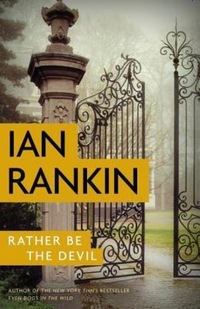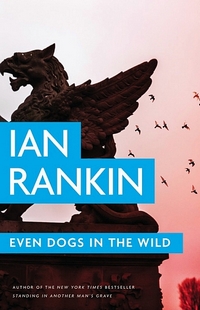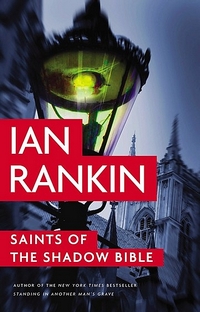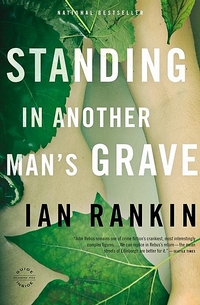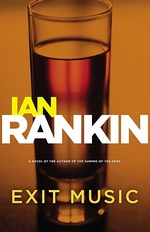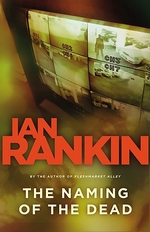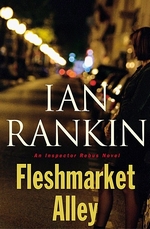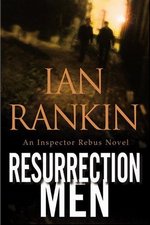I got off-track with these books when I took my trip out of state for my son’s transplant (I was due to go to the library to pick this up the day we got the call), and it took me a bit to get back on top of things. I’m so, so glad I was able to return to this world. I missed it.
—
by Ian Rankin
Series: John Rebus, #17
Hardcover, 421 pg.
Little Brown and Company, 2007
Read: October 17 – 18, 2018

Before I get into this, last week my son was playing some EASports game — FIFA something, I think. Anyway, I notice that he’s playing Hiberian, and my first thought is, “Hey, that’s Siobhan’s team.” That’s a sign that I’m probably reading too many Rebus novels, right? Anyway, on with this post…
| |
“No sign of any abandoned cars in the multistory?”
“Good point, Shiv, I’ll have someone check. Talk to you later.” The phone went dead, and she managed a little smile, hadn’t heard Rebus so fired up in several months. Not for the first time, she wondered what the hell he would do with himself when the work was done.
Answer: bug her, most likely–phone calls daily, wanting to know everything about her caseload. |
I think many readers, like DS Clarke, have wondered just what Rebus will do after retirement — which is looming as this book begins. Actually, it’s more than looming — it’s 10 days away. Ten days of Rebus trying to squeeze in any last-second mentoring he can, ten days of him trying to get Clarke invested in cold cases he can’t let go of, ten days of Rebus trying to stay relevant, active . . . ten days of John Rebus trying to remain John Rebus.
John Rebus has no family left, few friends, only a handful of colleagues that trust him, no plans for retirement at all. He’s going to have to come up with something, he knows, but he can’t really contemplate that reality, much less plan for it.
But first, there’s a murder — a man without any identification on him has been found by a few pedestrians out for a late-night walk, apparently beaten to death. A literately-inclined morgue worker recognized him as a Russian exile and poet of note. Plunging Rebus and Clarke (named to lead the investigation, only because of Rebus’ impending retirement *wink*) into an investigation with international implications.
Funnily enough, a contingent of Russian businessmen is in Edinburgh looking for investment opportunities, all of which are welcomed and encouraged by members of Scottish Parliament — especially by those MSPs seeking independence. None of the MSPs have any interest in their Russian friends being hassled by detectives over a pesky little thing by murder. Even if the victim was drinking in the hotel they were staying at shortly before the murder.
But once Di Rebus finds not only a link between the victim and their hotel bar, but a link between the poet and Gerald Cafferty, and links between Cafferty and the Russian delegation? All bets are off. The clock is ticking on his career — and the ticking is getting really loud — but here’s Cafferty with some sort of connection to a murder victim? There’s no way that John Rebus can let this go (not that Siobhan Clarke is that interested in letting this opportunity pass by, either).
The investigation isn’t making too much progress, but maybe is getting far enough, when someone else connected to the case is killed. And the investigation looks like it’s dealing with a web of drugs, prostitution, blackmail, international interests, politics, a large national bank a poet, and Cafferty. Which would be a lot to deal with even without Rebus’ deadline.
While preparing for Rebus’ departure, Clarke takes a uniformed PC under her wing — he has talent and ambition — he was one of the two initial officers at the site of the original murder and wants to be a detective soon. Clarke brings him along with her to many interviews and visits to various places in the investigation, as him run errands and even do some of the grunt work (scouring through hours of audio recordings that may or may not hold relevant information). He’s an interesting character — he adds some emotional weight to some scenes, and comic relief in others.
It’s possible that Rebus is at his most introspective in these pages — he knows his career is finished and that in no time at all he’ll be forgotten by just about everyone. What’s been the point of it all?
| |
Outside in the car park he unlocked his Saab, but then stood there, hand on the door handle, staring into space. For a while now, he’d known the truth–that it wasn’t so much the underworld you had to fear as the overworld. Maybe that explained why Cafferty had, to all purposes and appearances, gone legit. A few friends in the right places and deals got done, fates decided. Never in his life had Rebus felt like an insider. From time to time he’d tried–during his years in the army and his first few months as a cop. But the less he felt he belonged, the more he came to mistrust the others around him with their games of golf and their “quiet words,” their stitch-ups and handshakes, palm greasing and scratching of backs. |
Still, he perseveres, he gets into hot water with his superiors, with Clarke, with government officials, and — of course — Cafferty. In the end, despite the large number of detectives eventually working on the murders, Rebus is the only one to focus on the important facts (it helps that he’s not worried about what happens after the arrest, like everyone else is) and makes the important conclusions so that the cases can be closed in time for him to leave the force. It’s really a nice bit of storytelling by Rankin here, and I’d be very happy reading it even without all the hubbub around Rebus’ retirement. And then Rankin ends it with a jaw-dropping final chapter and a last line that just about floored me.
I’m so glad that I’m discovering these books now — when I know that there’s a future for Rebus (even if I’m not really sure what it is, but there are 5 books to come, at least). It can’t have been easy for Rebus fans to close this book not knowing what Rankin was going to do next.
At the same time, this remains a decent entry-book — like every other book in this series. Sure, you get more of the emotional weight if you’ve been reading about the DI for several books, but Rankin writes them in a way that the weight can be seen regardless.
I think if this were any other Rebus book, I’d rate it 4 stars for the case work, the internal squabbles with the hierarchy and the politics — but when you add in Rebus counting down the last ten days of his career, the hope of this case leading him to one more shot at Cafferty, the reflections on what he’s done and why he’s done it and what it cost . . . essentially, all the intangible things, the parts of a novel that are hard to pin down, much less describe. All that combined with a strong story, some excellent non-Rebus/Clarke/Cafferty character development (not that theirs isn’t strong as usual, but this is a new characters) — and it’s easy. Rebus retires with a 5.
—–


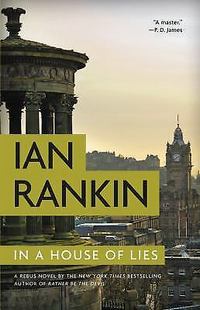 In a House of Lies
In a House of Lies

![]()



